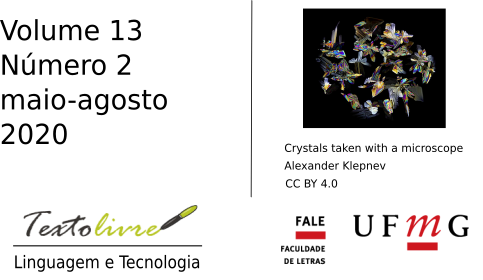Analysis for finding the effect of mind mapping technique on the iranian English as Foreign Language learning’ writing skills
DOI:
https://doi.org/10.35699/1983-3652.2020.24559Palabras clave:
Mind mapping, Teaching writing, Writing organization, Writing styleResumen
Instructors are always interested in creating environments that motivate students to engage dynamically in their learning process. Mind mapping is one of the teaching and learning strategies that has emerged in this regard. The aim of this study was to determine the effect of mind mapping technique on the development of the organization of writing and learning of intermediate English as Foreign Language (EFL) language learners in Iran. Accordingly, thirty female intermediate English language learners were selected from a well-known institute in a small city as the participants of the study. They were randomly allocated to a control as well as an experimental group each consisting of 15 subjects. The control group was provided with the usual training, while the experimental group was presented with the intervention twice a week during the summer of 2019. Pretest and posttest were applied for both groups in this experimental study and the results were then compared. Based on the research findings application of mind mapping in teaching writing could improve the learners’ writing organization. However, it didn’t show any significant effects on their writing style. As the results of the statistical analyses indicated, an application of mind mapping in writing classes would help the learners to organize their writings in more effective ways..
Descargas
Referencias
AL-JARF, R. Teaching spelling skills with a mind-mapping software. Asian EFL Journal Professional Teaching Articles, 53,p. 4-16, 2011. Retrieved from http://70.40.196.162/PTA/Volume-53raj.pdf
ALJASER, A. M. The Effectiveness of Electronic Mind Maps in Developing Academic Achievement and the Attitude towards Learning English among Primary School Students. International Education Studies, v. 10, n. 12, 2017.
AL KAMLI, H. M. The Effect of Using Mind Maps to Enhance EFL Learners' Writing Achievement and Students' Attitudes Towards Writing at Taif University. (Master Thesis), Arab World English Journal (ID Number: 232), p. 1-92, 2019. DOI: https://dx.doi.org/10.24093/awej/th.232
AL NAGHBI, S. The use of mind mapping to develop writing skills in UAE schools, 2008. Retrieved from: https://www.emeraldinsight.com. Accessed on: 20 August 2018.
BIKTIMIROV, E. N.; NILSON, L. B. Show them the money: Using mind mapping in the introductory finance course. Journal of Financial Education, 32, p. 72-86, 2006.
BOROVKOVÁ, M. P. Application of mind maps in ELT with the emphasis in lexis. Unpublished MA Thesis: Charles University in Prague, Prague, 2014.
BROWN, D. H. Language assessment: principles and classroom practices. New York: Longman, 2003.
BURNS, B. Mind Mapping: 7 ways to use mind mapping as a developer, 2014. Retrieved from: https://www.netguru.co/blog/mindmapping-7-ways-to-use. Accessed on: 20 August 2018.
BUZAN, T. Use both side of your brain. New York: E.P. Dutton Co, 1976.
CRESWELL, J. W. Research design: Qualitative and quantitative approaches. Thousand Oaks, CA: Sage, 1995.
ERDIANA, N. Improving Students’ Writing Skill through Mind Mapping. Proceedings of the 1st EEIC Conference: Banda Aceh, Indonesia, 2016.
HAJI MAIBODI, A. The impact of mind mapping strategy on vocabulary use in the writing of Iranian EFL learners. Unpublished M.A. thesis. Islamic Azad University, Maybod Branch, 2017.
INGEMANN, M. The power of mind mapping. London: John Benjamin Publishers, 2017.
JAFARI, N.; ZAREI, GH. R. The influence of concept mapping on iranian intermediate EFL learners argumentative essay writing skill. Journal of applied linguistics and language research, 2, p. 98-112, 2015.
KARIMATUL FAJRI, A. Improving Students’ Writing Skill by Using Mind Maps: A Classroom Action Research on the 10th Grade Students. Unpublished MA thesis Sebelas Maret University, 2011.
KHOIRIYAH. Increasing the students writing skills through mind mapping technique. Nusantara of Research, 1, (2), p. 14-21, 2014.
KHUDHAIR, N. K. The impact of applying mind mapping technique as a prewriting tool on EFL college students in essay writing. J Of College of Education for Women. 27 (1), p. 426-436, 2016. Retrieved from: https://www.iasj.net/iasj?func=fulltext&aId=117731. Accessed on: Mai 12th, 2019.
LANSEUR, K.; HADDUCHE, S. Enhancing EFL Students’ Writing Skill through Mind Mapping Strategy. The People’s Democratic Republic Of Algeria Ministry Of Higher Education And Scientific Research Abderrahmane Mira University Of Bejaia Faculty Of Arts And Languages Department Of English, 2019.
MINGLI, L. Using Mind Maps to Develop English Majors’ Essay Writing in China. Sino-US English Teaching, v. 16, n. 10, p. 419-425, 2019.
NEMATI, A.; JAHANDAR, SH.; KHODABANDEHLOU, M. The effect of mind mapping technique on the enhancement of advanced iranian EFL learners’ essay writing ability through organizing information and thoughts. Indian Journal of Fundamental and Applied Life Sciences, 7, p. 78-93, 2014.
NOURI MOHAMMED, A. Introducing the mind map technique to promote lesson summarizing in EFL instruction: Case study of first year IMD student of the English language. Unpublished PhD Dissertation at Mohamed Khieder University of Biskra University: Lampour, India, 2013.
O’HARA, D.; BUDIYONO, B. Using Mind Mapping to Improve Argumentative Writing Score Of Eleventh Graders. Magister Scientiae, 106 Edisi No. 45, 2019.
RISWANTO; PUTRA, P. P. The Use of Mind Mapping Strategy in the Teaching of Writing at SMAN 3 Bengkulu, Indonesia. International Jurnal of Humanities and Science, 2 (21), 60-68, 2012.
SAED, H. A.; AL-OMARI, H. A. The effectiveness of a proposed program based on a mind mapping strategy in developing the writing achievement of eleventh grade EFL students in jordan and their attitudes towards writing. Journal of Education and Practice, 5, p. 88-109, 2014.
VITULLI, P.; GILES, R. Mind Mapping: Making Connections with Images and Color. Delta Journal of Education, 6(2), p. 1-10, 2016.
Descargas
Publicado
Número
Sección
Licencia

Esta obra está bajo una licencia internacional Creative Commons Atribución 4.0.
Este es un artículo de acceso abierto que permite su uso, distribución y reproducción sin restricciones en cualquier medio siempre que se cite correctamente el artículo original.











